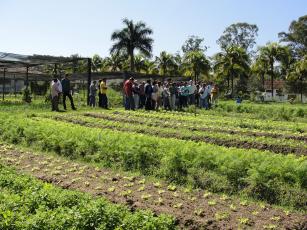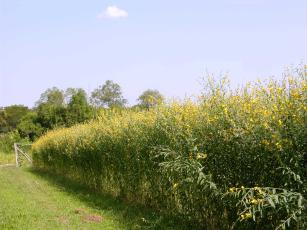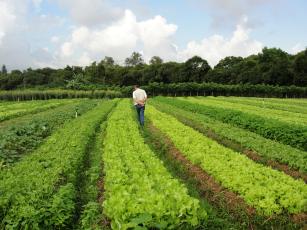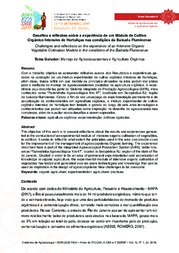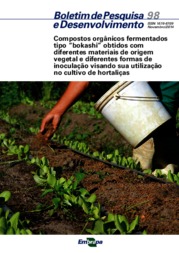Cultivo orgânico de hortaliças
Organic vegetable cultivation
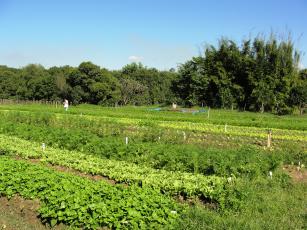
Photo: BELLO, Liliane
Technologies linked to the conventional agriculture model based on the use of agro-chemicals strongly boost vegetable production, but demonstrate problems concerning the health of products, farmers’ quality of life, and the conservation of biodiversity. Organic horticulture, on the other hand, eliminates the risks coming from pesticide use and contributes to environmental sustainability, having solutions to overcome existing limitations in terms of plant nutrition and phytoparasite control.
Nutrition with nitrogen is critical for the sustainability of organic production units because using nitrogen fertilizers is not allowed. Thus, two practices are fundamental to maintain production capacity: organic fertilization and green fertilization. From the phytosanitary aspect, there is an appreciation for the use of plants that provide vital resources for the natural enemies of pests, as well as for adopting measures to fully express the natural mechanisms of plant defense, through the use of alternative chemicals, such as homemade mixtures, biocontrol agents and plant extracts.
All these resources have been used yearly in the organic production of vegetables at Fazendinha Agroecológica Km 47, a farm space resulting from a partnership between Embrapa Agrobiology, the Federal Rural University of Rio de Janeiro (UFRRJ), and the Rio de Janeiro Agricultural Research Company (Pesagro-Rio). The area has an experimental module for intensive vegetable production that maximizes nutrient recycling s, biological nitrogen fixation, alternative control of phytoparasites, and the use of adapted cultivars.
In the intensive vegetable production module there is a wide use of green fertilizing practices with leguminous plants, grass composting with castor meal, crop rotation, intercropping, and crop diversification. Phytoparasites go through conservation biological control and, when necessary, there are sprays with lime sulphur bordeaux mixture, neem extracts, and biocontrol agents such as Bacillus thuringiensis.
The results of "Fazendinha's vegetable garden" show that organic production techniques are enough for the cultivation of leafy vegetables, fruits, and roots. High quality products that meet the needs of the consumer market are obtained, and it is possible to define recommendations about seedling substrates, green and organic vegetable fertilizing, as well as alternative control of phytoparasites
Where to find:
Link para mais informações:
https://www.embrapa.br/en/busca-de-solucoes-tecnologicas/-/produto-servico/94/cultivo-organico-de-hortalicas
https://www.embrapa.br/en/busca-de-projetos/-/projeto/12763/leguminosas-para-adubacao-verde-como-fonte-de-carbono-e-nitrogenio-no-cultivo-organico-de-hortalicas
https://www.embrapa.br/en/busca-de-projetos/-/projeto/202336/uso-de-plantas-de-cobertura-do-solo-na-sucessao-de-cultivos-de-hortalicas-sob-manejo-agroecologico
Sobre o módulo de cultivo orgânico intensivo de hortaliças da Fazendinha Agroecológica Km 47: https://ainfo.cnptia.embrapa.br/digital/bitstream/item/194532/1/desafios-e-reflexoes.pdf
Sobre o uso de bokashi:
https://ainfo.cnptia.embrapa.br/digital/bitstream/item/126213/1/bot098-2014.pdf
Sobre adubação verde na Região Serrana fluminense: https://ainfo.cnptia.embrapa.br/digital/bitstream/item/100900/1/CIT32-12.pdf
Embrapa Agrobiologia
Rodovia BR-465, Km 7
Bairro Ecologia, Seropédica/RJ
Fone: (21) 3441-1500
Agricultural System: Production system with intercropping or polyculture Launch year: 2005
Responsible Unit: Embrapa Agrobiology
Participating Units: Embrapa Agrobiology
Keywords: Hortaliças, agricultura orgânica

